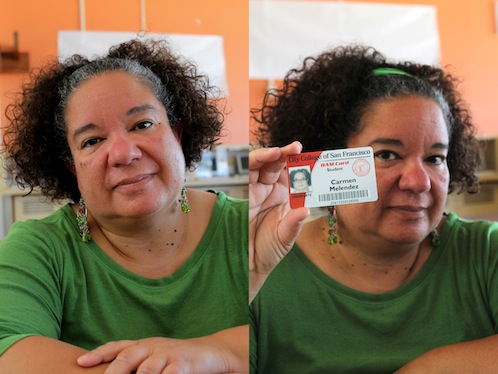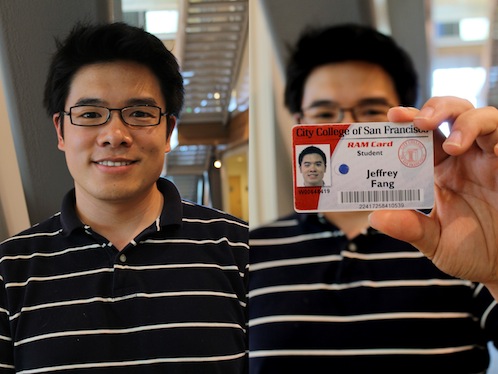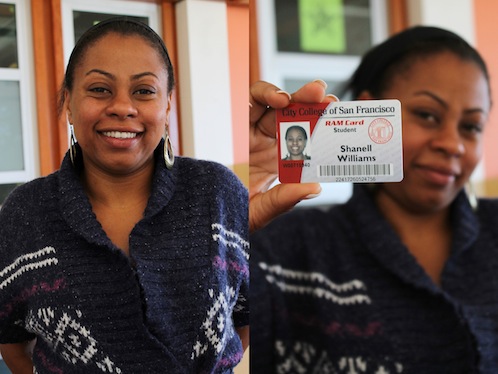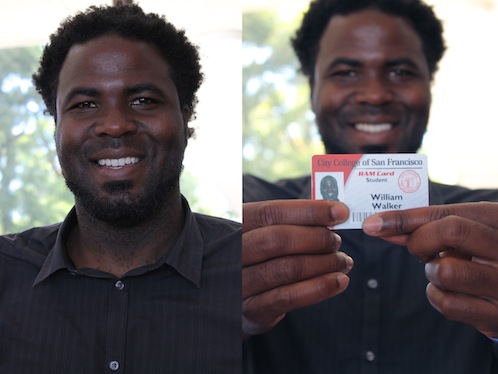After a harsh accreditation review detailing financial and administrative failures last month, City College of San Francisco has been given a year to prove itself worthy of accreditation or face the risk of closure. (Read ongoing coverage from the Public Press via Storify.) Though the school’s community has promised to fight the criticisms with change, it will be an uphill battle for all those involved. In the struggle to keep the school’s doors open, the possible loss of accreditation would affect more than 120,000 City College students, faculty and staff. Here, in their own words, are some of their stories.
“I completely reinvented myself while raising a young son. I had to survive and City College gave me the tools.” — Carmen Melendez, 50, student
What are you studying?
Art.
Do you have an outside occupation?
No, but I am also a parent.
Are you full-time or part-time?
Full-time.
Why did you enroll at City College?
It was accessible, affordable and an option I had used in the past. When I first came to San Francisco in 1987, I wanted to study art but discovered that it was going to be an uphill battle financially. In 1990, I enrolled in the commercial print and graphic design program. By 1995, I almost had enough units to get my A.S. in graphic design. I got a job in the industry and completely reinvented myself while raising a young son. I had to survive and City College gave me the tools to do that. Later on I decided to become a teacher and I had to put my art skills on the backburner. Now that I have come out of teaching, art is what I really want to do. I’m back to City College because they have the training and capability to give me an education for a fraction of what you pay everywhere else.
Did you anticipate the negative accreditation report?
I didn’t know the backstory so I didn’t see it coming. But it didn’t surprise me either. I was involved earlier this year in the protest against the Student Success Act, which was a push to get the community out of community colleges in California. We were one of the few colleges that protested. When this report came out, I wasn’t surprised because it’s part of the same push to limit community colleges and make them rinky-dink junior colleges that only cater to one kind of student.
If City College lost its accreditation, how would that personally affect you?
I would be mad as hell. I would be busy trying to organize students. We’re not begging anyone here. We’re not getting any favors from anyone. We just want our education.
Do you have confidence in the school’s current leadership?
Some people work better than others. Our student trustee is phenomenal. He is trying really hard to get student voices into the mix, which has always been an afterthought. But there’s a tremendous disconnect between the faculty, administration, and students. The board of trustees had a chance to fix this six years ago and have refused to deal with this festering crisis. Nobody was keeping them honest. The time for that is gone.
One criticism of the school is that there’s not enough evidence that the school adequately prepares its students for life after City College. What are your feelings on this?
There are definitely gaps in accountability. It involves a lot of tracking, assessing – I was a teacher, I know. The bottom line is you need personnel to track it. You need a comprehensive plan for many years. None of that exists here because there hasn’t been personnel or funding for these efforts. Testing shouldn’t be the priority but keeping some kind of system throughout the whole college should be important.
What is the best idea you’ve heard to save City College?
I wish there were concrete plans. As students, the closest thing we have to a plan is to grow a base of informed students that can train and educate others. We also have to demand participation and know the measures we need to take.
Are you optimistic for the future?
You have to be. What’s the other choice? Resign yourself and say “Oh bother, everything is going to hell”? You can’t. My nature is to assume everything is going to come out the best possible way – not necessarily my way, but the best possible way. Otherwise, I wouldn’t be here. I’m middle-aged, I’m becoming an artist and this place has given me so much hope for the future. This place is exceptional and it has to be saved.
“Coming to San Francisco as an immigrant, I didn’t know what to do.” — Jeffrey Fang, 30, student
What are you studying?
Philosophy.
Do you have an outside occupation?
No.
Are you full-time or part-time?
Full-time.
Why did you enroll at City College?
It was the last stop for me. I didn’t work very hard in high school. Coming to San Francisco as an immigrant, I didn’t know what to do. I dropped out the first time around after working. Afterwards I worked as a banker at Bank of America. I came back in 2008 to finish my degree. This place has always had good teachers and I found care and guidance here that I didn’t find elsewhere.
Did you anticipate the negative accreditation report?
It didn’t come as a complete shock. As the last student trustee, I kind of expected it. I knew that our board of trustees was playing political games internally and externally more than doing their jobs. It tore the institution at its core. We got this because we didn’t work at it. What did surprise me is how bad it got. I was expecting probation, not the show cause status.
If City College lost its accreditation, how would that personally affect you?
We would probably get taken over by another district – San Mateo makes the most sense. We would become an education center that would be administratively governed by San Mateo. But it would mean that we failed the students we serve. It would mean that even in the worst possible situation, we did not come together.
Do you have confidence in the school’s current leadership?
I have faith in individuals on the board, but I’m not certain that the group will get things done. I trust Will Walker, my successor. From what I’ve seen so far, Dr. Fisher, the interim chancellor, is competent. Unfortunately she’s only here for a little while. As far as the board of trustees, I don’t have confidence in them as a group. More often, they have served to divide the institution for their own political gain than looking out for the greater good. I’ve seen it first hand and it’s undeniable.
One criticism of the school is that there’s not enough evidence that the school adequately prepares its students for life after City College. What are your feelings on this?
When a school produces a self study report for the accreditation commission, they’re telling their own story to their peers. If you can do that well, you get a passing grade from the accreditation commission. That’s really what it is. We didn’t do a good job telling our story. I was involved with writing City College’s self study. But when we came up with our original report, the then-chancellor Dr. Griffin kowtowed to the board of trustees. They severely edited out anything that pointed to the failings and faults of the board.
What are some of the things they edited out?
They took out parts that talked about how the board was violating established protocol. It’s been proven in previous meetings, but they said it wasn’t true and took it out. The board has a manual that directs the policy of the whole school but they didn’t realize that they weren’t subjected to those policies too. They would work with faculty to undermine the chancellor’s authority. All these little things were included in the report but they edited it out. Instead, in the section on student learning outcomes, they put in their pet projects praising themselves.
What is the best idea you’ve heard to save City College?
The best plan calls for everyone to come together and for the first time, stop politicking against each other. That will stop the war internally. The second best thing has been on the table for two years: We need money. For the past two years, the board has known about the parcel tax option but they’ve been delaying it for their own benefit so it doesn’t hurt their chances when they run for re-election. Another plan is to look at efficiency and the number of instruction sites we have. We certainly need the 10 campuses but not 200 instruction sites.
Are you optimistic for the future?
I am. City College survived a crisis close to this degree about 12, 14 years ago. There’s just the question of how we will survive and what we will end up being afterwards. We need to be careful so that when we survive, we don’t lose who we are.

“When I was finishing up at San Francisco State in 1994, there was a job available here.” — John Kennedy, 50, classified staff
What do you at the college?
I’m the Information Systems Administrator.
Do you have an outside occupation?
No.
Are you full-time or part-time?
Full-time.
Why did you come to City College?
When I was finishing up at San Francisco State in 1994, there was a job available here. I like the college, the people. I thought, “Gee, this is a great place to do what I like to do” which is education, but for adults.
Did you anticipate the negative accreditation report?
No, I was very surprised. I wouldn’t have been surprised if there were negative aspects in the report, but the show cause status was kind of a shock.
But you had seen issues with the budget?
I had seen very good times and very bad times.
But you didn’t consider now as the worst time?
Well, it did seem like the worst time, but I didn’t think the college was in danger of closing. I thought this was just the kind of bad financial situation that every college was going through.
If City College lost its accreditation, how would that personally affect you?
My job would be in danger, I’m sure. More than that, though, it would be very disappointing to have come to work for an organization that I thought was permanent. As long as there’s a San Francisco, I assumed there’d be a City College. I thought I’d be part of that and to imagine seeing the end of that is shocking.
Do you have confidence in the school’s current leadership?
I am confidant because they’re backed into a corner where there’s no alternative but to get things done. Given several options, I’m not sure the board of trustees would choose the wisest one, but I don’t think they have a lot of options in the first place.
One criticism of the school is that there’s not enough evidence that the school adequately prepares its students for life after City College. What are your feelings on this?
If you tell me that there’s a certain process to document that we’re preparing our students for life after college and we’re not doing that, I wouldn’t be surprised. But I know from working here that we are preparing our students. I see students that leave here become successful. They transfer, graduate, find jobs, buy homes and have families. I know that we are preparing students and if there’s something we need to do to document that better, we’ll do that.
Speaking of options, what’s is the best idea you’ve heard to save City College?
The school is too spread out. We have too many campuses and it seems like a big drain on our budget. I know for every site there’s a reason why it should stay open, but we’re in a situation where we can’t do that anymore. Centralizing the campus has been talked about but no action has ever been taken. We have an administrative center on Gough Street. Every time I need to deal with administration, payroll or the business dealings of the college, I wish it was here at the Ocean campus where most of the employees are.
Are you optimistic for the future?
I am, actually. Sometimes it takes a crisis for people to get galvanized and enthused and to stand up and say, “Something needs to be done and I want to be one of the people to do it.” I think that there are people around who will take charge. If they don’t and I’m wrong, then I’ll be surprised. In five years, I think we’ll be a better college. We’ll be able to show that we do good work. In the next accreditation cycle, I wouldn’t be surprised that we get a good report.
“I came to City College in 2002 straight out of high school and the foster care system because I thought it was the best next step.” — Shanell Williams, 27, student
What are you studying?
Urban Studies.
Do you have an outside occupation?
I’m a community organizer.
Are you full-time or part-time?
Full-time, soon to be part-time.
Why did you enroll at City College?
I came to City College in 2002 straight out of high school and the foster care system because I thought it was the best next step. I had graduated from a continuation school where I was in this two-year program for adolescent girls in San Francisco. But I didn’t have a lot of direction and guidance about what I wanted to do, so I left and worked in the nonprofit field. It took me a while to come back because I was helping my mom, who is disabled, with financial stuff but I came back in 2009 to move forward with my education.
Did you anticipate the negative accreditation report?
I’m just now finding out about all this. It’s been really frustrating to not have transparency with a lot of the decisions that were made in revenue and funding. I’m the Associated Students president so I’m coming into a role where I supposed to be organizing and reaching out to the student body. But we need more information to be fully included. I’m just kind of blown away about the seriousness of where we are.
If City College lost its accreditation, how would that personally affect you?
Well, I don’t know where I’d go to school. I’m at that point where I’m just about to transfer out. For me, I really, really need City College. I can’t envision myself going to another county to complete my last year and it’s really anxiety provoking. It makes me want to fight even harder because I’m not someone on the outside saying they want to fight for students, I’m actually an enrolled student trying to finish my education and this is my one option.
Do you have confidence in the school’s current leadership?
I want to believe in them and give them the chance to step up their leadership. I think they’re doing that at this retreat right now. I also feel that there’s a disconnection between them and the student body. I want to see them bring the college together. Since they’re the top tier of leadership at this school, they need to ensure that.
One criticism of the school is that there’s not enough evidence that the school adequately prepares its students for life after City College. What are your feelings on this?
We need to be collecting the stories of the students and alumni. It’s so critical to keep account of our successes and we need to keep track of the people who come to our school. It needs to happen now. It baffles me that we aren’t doing that and it needs to happen now. We’ve been training the San Francisco/Bay Area work force. There are a lot of success stories out there, but we need to gather the data so we can present the true story of City College.
What is the best idea you’ve heard to save City College?
I think the best plan is two-pronged: making our internal structure more efficient and generating revenue with the tax proposals in November. In terms of the internal structure, we need to have everyone’s voice involved to look at systems that would make us more affective. But this doesn’t mean our mission should be shrunk down. I like that City College offers GED and transfer certificates and I don’t want classes or services to be cut.
Are you optimistic for the future?
Yes. The one thing that makes me excited for the future is that students are stepping up. They know this fight is about coming together with the community, workers, laborers and asking them to help us fight for our future and education.
“I’m a displaced worker… I realized I didn’t have any resources so I moved back home.” — William Walker, 32, student
What are you studying?
Geographic Information Systems.
Do you have an outside occupation?
No.
Are you full-time or part-time?
I’m a full-time re-entry student and the student trustee.
Why did you enroll at City College?
I’m a displaced worker. I lost a job in Los Angeles in November 2010 while I was on medical leave. While living in L.A., I realized I didn’t have any resources so I moved back home to Diamond Heights with my family briefly. I decided that I needed to retrain. I’ve been in a number of low-level jobs in the Bay Area so I’m getting a certificate in Geographic Information Systems, which is like digital mapping and the backbone of all the GPS databases and why you can look at your phone and know instantly where you are.
Did you anticipate the negative accreditation report?
I won’t say it was a complete shock. There were a lot of things broken at City College when I left the school eight years ago.
What prompted you to assume such a public role?
What I find here at the college is that there’s so much division. I think the board retreat demonstrated that. But I’m a leader. I grew up here in San Francisco and I appreciate that we have a really active community. Students don’t deserve to lose 700 classes in one year and to deal with the labyrinth of bureaucracy that is looking for a counselor. There’s a lot that’s broken here and some perspective needs to be shown on the situation from individuals who have a history and came through this system and know what it takes to fix it.
If City College lost its accreditation, how would that personally affect you?
I’m in a really unique position. Even if we lose our accreditation, the students still have a voice. By no means do I want to see our college lose our accreditation, but I’m probably the only person involved whose role won’t change. As for what the loss would mean to me personally, I’m in a program that’s staffed by part-time faculty so my program is at risk of not being here. It’s a very small, specific program and for that reason, I enrolled in both the beginning and intermediate sections of it in case it’s not offered again next semester.
Do you think a lot of students have to double up on courses because some might get cut later?
I think a lot of students do that and it’s detrimental to our capacity to learn.
Do you have confidence in the school’s current leadership?
I think it’s time for the seven-member board to be held accountable for not following any of the recommendations that were prescribed by the accreditation commission six years ago. Now we have eight more recommendations – that’s 14 total. When I hear “We’re gonna do all we can to solve this!” it doesn’t do anything to put me at ease. What puts me at ease are the different work group meetings and the discussions that are happening there.
One criticism of the school is that there’s not enough evidence that the school adequately prepares its students for life after City College. What are your feelings on this?
I think we need to address whether or not an Associate’s Degree should really be awarded just because you’ve finished a sequence in a department. It would be a lot better if a degree did prepare you for something beyond transferring to a four-year university.
What is the best idea you’ve heard to save City College?
I think if we want to save all our campuses, we need to figure out if that’s something the residents of San Francisco will prioritize. Part of the funding could come from the parcel tax, but from what I understand, that would only cover $14 million a year. I think that the best plan that we have is to come together as a community and figure out how we’re all going to give up something to keep moving forward.
Are you optimistic for the future?
I think we have to be. We have a challenge ahead of us but we have a community that wants to put its heads together and figure out how to move forward. For that reason, and because of the level of involvement I’ve seen at board meetings, community events, strategy sessions and coalition meetings, it seems that we have the critical mass to get all the ideas out. We just need to do it.
Read additional interviews and ongoing coverage from the Public Press via Storify.












